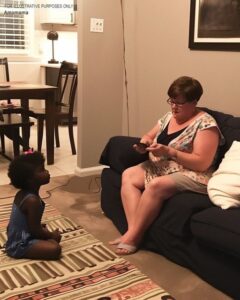
Isabella’s mother-in-law, Margaret, refused to accept their adopted daughter, Lily, always pushing for a “real” grandchild despite Isabella’s health issues. When Margaret showed up at Lily’s birthday with a cruel gift, Isabella decided it was time to teach her a lesson.
“Are you sure we’re ready for this?” Michael asked, his hand trembling slightly.
“Yes, Michael,” I replied, feeling a mix of excitement and nervousness. We were about to finalize Lily’s adoption, a moment we had waited for so long. The adoption counselor walked in, paperwork in hand, guiding us through each step until the final document was signed. Tears welled in my eyes as I held Lily close, knowing she was finally ours.
We threw a welcome party for Lily, surrounded by supportive friends and family. But the absence of Michael’s mother, Margaret, weighed heavily on me. Margaret had been cold since learning of our decision to adopt, insisting that we needed to have a biological child instead. Michael reassured me that we were doing the right thing, focusing on our little family rather than Margaret’s disapproval.

A week later, as I baked a cake for Lily’s birthday, I hesitated about inviting Margaret. Michael insisted, hoping his mother would come around. The party was a joyful affair, with children laughing and Lily beaming as she opened her presents—until she reached Margaret’s gift.
It was a mug, inscribed with the words “The Best Oldest Sister.” Confusion spread across Lily’s face, and whispers filled the room. Someone asked if this was a pregnancy announcement, but I knew better. This was Margaret’s cruel way of saying Lily wasn’t enough, pushing again for a biological grandchild. My heart ached as I saw the confusion in Lily’s eyes, and my anger simmered.
That night, I couldn’t let Margaret’s actions go unchecked. I recorded a phone conversation with her, where she dismissed Lily and insisted that we should focus on having a “real” child. Her words were like daggers, but they solidified my resolve. After hanging up, I posted the recording and a photo of the mug on Facebook, exposing Margaret’s cruelty to everyone.
The reactions were swift. Friends and family expressed outrage and support, condemning Margaret’s behavior. It was a relief to have the truth out in the open, to know that others stood by us. Michael and I knew we had done the right thing. Margaret’s actions were met with widespread criticism, and we felt a sense of peace knowing we had stood up for Lily.
This experience strengthened our bond as a family, and though Margaret’s relationship with us was damaged, we knew that protecting our daughter was the most important thing. In the end, we learned that sometimes standing up for what’s right means facing difficult truths and making tough decisions.





